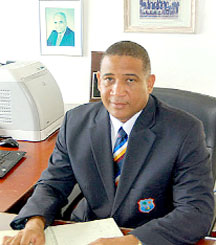BRIDGETOWN, Barbados, CMC – Ernest Hilaire expected there would have been players unwilling to sign the West Indies Cricket Board’s central retainer contracts.

But the Chief Executive Officer of the WICB clearly wants to move on from the setback, after he announced that the regional governing body was spending around US $15 million on a development programme that included more youth cricket, training camps, and representative tours.
Incumbent West Indies captain Chris Gayle, as well as all-rounder Dwayne Bravo and Kieron Pollard stunned the region and the cricket World over the last two weeks, when they chose not to accept WICB central contracts.
Outside of sporadic appearances for West Indies and in regional cricket, they have all opted to shop their skills around to the highest bidder in lucrative domestic leagues around the World.
“It is the players right to decide whether or not they want to accept a central contract,” said Hilaire at a media conference on Sunday, following a two-day WICB directors meeting.
“I was not entirely surprised they were players that were not willing to sign the central contract. There seems to be a thinking out there – and I’m not sure who has advised them – that they don’t have to sign central contracts, and they can still play wherever they want.”
He noted: “The rules of international cricket do not exactly allow for this. But they have made their decision, and we have been in contact with them, and they felt they were making the best decision.”
Hilaire disclosed that the WICB directors have started dialogue about how to minimise such fallout in the future that would essentially “make all stakeholders happy”.
But he emphasised that the WICB has probably been the most generous international board in granting No Objection Certificates, which gives players permission to play in domestic leagues of other international boards.
“It has been to our detriment,” he said. “We gave an NOC to a player to play in the Big Bash [in Australia], he got injured, and could not play for our One-day International team. We have also allowed players to arrive days before important matches, and play for West Indies.
“Our players go to play in these leagues, and they still get paid their monthly retainers. We have never made deduction from any player’s salary for this reason. We have been extremely gracious and accommodating to our players, and it has been to our detriment, especially when they get injured because it is a cost for us.”
Hilaire added: “But no other international board has been this generous because they recognise it is not in the best interest of their cricket.
“We have allowed it to happen, and the time has come not for us to say we are not supporting any player playing elsewhere, but to find the right arrangement and framework in which our interest is not compromised.”
Hilaire outlined there were three principles, which a new policy should cover. They were protecting the primacy of international cricket, ensuring WICB competitions are organised and played at such a standard that they are successful, and satisfying the ambitions of the players.
“It is a dialogue that has to take place among multiple stakeholders,” he said. “It is still very early in that dialogue. . .But it is a dialogue that has to take place in the region to ensure the survival of our cricket.
“But I can assure you that all of the [major] cricket-playing countries are facing this same issue, and discussing how best to handle this matter of players wanting to play in other leagues because of the value of playing.”
Hilaire also revealed that two of the three players that rejected central contracts have responded to enquiries by the WICB about their decision.
“One player responded and listed about five queries he had to which we have already responded,” he said.
“One of the other two said he is hoping he gets a chance very soon to explain in greater detail his position. And we have not heard from the third player.”
He concluded: “But we must accept it is their right. We engaged the players, and they took a decision. I am not sure it is the right decision, but they took a decision.
“We have to move on. We need to continue the building process, and this is what we are focussing on, as well as putting in place the necessary ingredients for success.”
